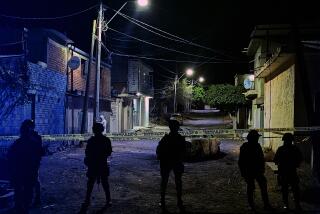Mitterrand to Visit Troubled New Caledonia
- Share via
PARIS — French President Francois Mitterrand, in a dramatic announcement, told a national television audience Wednesday that he will fly to the troubled French territory of New Caledonia to try to persuade the antagonistic racial groups there that their only hope for peace lies with Paris’ offer of limited independence.
Mitterrand acknowledged that the renewed violence in the Southwest Pacific islands, especially the killing by French gendarmes of a Melanesian independence leader last week, has complicated acceptance of the offer. He added, however, that “it has not jeopardized it.”
“It is obvious,” Mitterrand went on during a live television interview at the Elysee Palace, “that if we fail to achieve the balance of interests that the proposals would provide, then the territory cannot escape confrontation.”
The plan, presented to the New Caledonians 10 days ago by the French government’s high commissioner, offers a form of independence while legally retaining association with France. The new state of New Caledonia would have a seat in the United Nations under the plan, but France would continue to control its foreign affairs, defense and internal security. This form of independence, if approved in a referendum in July, would become effective at the beginning of 1986.
The plan has been rejected by leaders of the white population, who want New Caledonia to remain a French territory. The Melanesians, who make up the largest racial community but lack a majority, want complete independence from France. They appeared at first to be willing to negotiate, but their position hardened when the gendarmes killed a militant independence leader, Eloi Machoro.
Mitterrand said the killing of Machoro is deplorable. Still, he said, all interests will have to negotiate a settlement along the lines of the Paris plan because otherwise they risk what he called a worse alternative.
Christine Ockrent, the most popular anchor on French television news programs, asked the president if he had any plan to visit New Caledonia, a territory 12,500 miles from France, and Mitterrand replied, matter of factly, “I will go.”
Mitterrand’s press office said later that the president is expected to leave Paris tonight, and that it will probably take him a full day to reach New Caledonia.
Mitterrand was professorial as he explained the problems of New Caledonia. He described the territory as a “special situation” because unlike other places of the world, “there is not a single people there.”
He explained that the population is made up of 62,000 or 63,000 Melanesians known as Kanaks, 53,000 French whites known as Caldoches and 30,000 other people who come from other areas of the South Pacific and Asia.
“They have interests that are opposed and contradictory,” he said
Violence erupted in mid-November after Kanak separatists boycotted an election for the territorial legislature and declared an independent Kanak state. When High Commissioner Edgard Pisani arrived in early December, the Kanaks abandoned their rebellious government and began negotiating with him. However, Pisani’s presence has not stopped the violence, and at least 18 people have been killed.
The situation in New Caledonia has set off a bitter political debate in France. The rightist opposition has accused the Socialist government of Mitterrand and Premier Laurent Fabius of abandoning the large white French population. It regards the plan for independence with French association as a subterfuge for turning power over to the Kanaks.
Leftist newspapers, on the other hand, have raised doubts about the government’s version of the killing of Machoro. The government has said that gendarmes, intending to wound, not kill, fired on Machoro when he and a band of armed Kanaks threatened a white farm and opened fire on the gendarmes. Kanak leaders have denied that Machoro was threatening anyone and have accused the gendarmes of killing Machoro in cold blood.
The leftist newspapers have not accepted the Kanak version whole, but they have been even more skeptical of the official version.
In New Caledonia, the atmosphere remained tense, and graffiti both for and against independence appeared on walls in Noumea, the capital, Reuters news agency reported from the Pacific territory.
A pig’s head with a rose in one ear--the rose is symbolic of the French Socialist government--was dumped by settlers outside the French High Commission. A paper stuck to the head bore the name of Pisani, the special envoy sent by France to the territory to devise a plan for independence, bitterly opposed by most of the white settlers.
More to Read
Sign up for Essential California
The most important California stories and recommendations in your inbox every morning.
You may occasionally receive promotional content from the Los Angeles Times.












